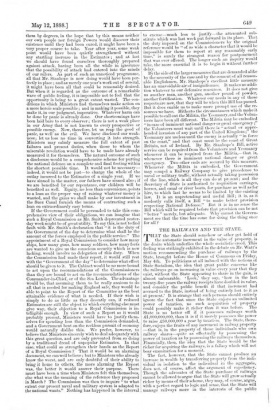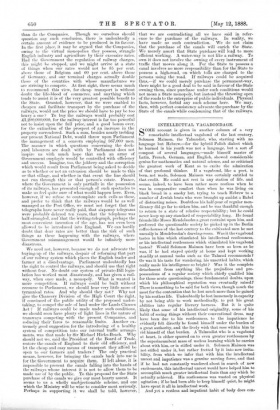THE RAILWAYS AND THE STATE. T HAT the State should somehow
or other get hold of the automatic increment in the value of property, is the desire which underlies the whole socialistic creed. This feeling was strikingly exhibited in the debate on Mr. Watt's motion recommending the purchase of railways by the State, brought before the House of Commons on Friday, May 4th. To politicians at all imbued with the notions of State Socialism, the idea that great public concerns like the railways go on increasing in value every year that they exist, without the State appearing to share in the gain, is almost unbearable. Look,' they say, how in the last twenty-five years the railway receipts have doubled in value, and consider the public benefit if that increment had accrued to the State, instead of being entirely lost to it as at present.' It is strange that such persons should entirely ignore the fact that since the State enjoys an unlimited power of taxation, no such acquisition of property could possibly make it richer than it was before. The State is no better off if it possesses railways worth £1,000,000,000, than it is if it merely possesses the power to raise £50,000,000 a year by taxation. The State, there- fore, enjoys the fruits of any increment in railway property —that is, in the property of those individuals who own railway shares—quite as effectually by possessing the power of taxation as by possessing the railways themselves. Financially, then, the idea that the State would be the richer for acquiring the railways, is a fallacy which will not bear examination for a moment.
The fact, however, that the State cannot produce an increase in wealth by transferring property from the indi- vidual in isolation to the individual in the aggregate, does not, of course, affect the argument of expediency. Though the advocates of the State purchase of railways cannot be allowed to argue that the State will grow actually richer by means of their scheme, they may, of course, argue, with a perfect regard to logic and sense, that the State will manage railways more in the interests of the public than do the Companies. Though we ourselves should question any such conclusion, there is undoubtedly a certain amount of evidence to be produced in its favour. In the first place, it may be argued that the Companies, owing to the virtual monopolies they possess, strangle English industry and agriculture by their excessive rates. Had the Government the regulation of railway charges, this might be stopped, and we might arrive at a state of things when our rates would not be 85 per cent. above those of Belgium and 60 per cent. above those of Germany, and our terminal charges actually double those of the countries with whose manufactures we are striving to compete. At first sight, there seems much to recommend this view, for cheap transport is without doubt the life-blood of commerce, and anything which tends to assist it is of the very greatest possible benefit to the State. Granted, however, that we were enabled to cheapen and facilitate transport by the purchase of the railways, would not the price we should have to pay be too heavy a one ? To buy the railways would probably cost £1,200,000,000, for the railway interest is far too powerful not to insist upon the full price, and a good bonus over, for the extinction of the prospect of an increase in the property surrendered. Such a sum, besides nearly trebling our present National Debt, would throw upon Parliament the management of a concern employing 367,000 men. The manner in which questions concerning the dock- yard labourers are dealt with by Parliament does not inspire us with much hope that such an army of Government employes would be controlled with efficiency and success. Imagine, too, the jobbery and the corruption which would result from Parliament being asked to decide as to whether or not an extension should be made to this or that village, and whether in that event the line should not run through this or that person's estate. France, where the Government is only partially in the possession of its railways, has presented enough of such spectacles to make us feel quite sure of what would happen here. Even, however, if we refuse to contemplate such evils as these, and prefer to think that the railways would be as well managed as the Post Office, we must not forget that the telegraphs have never really paid, that sixpenny telegrams were probably delayed ten years, that the telephone was half-strangled, and that the writing-telegraph, perhaps the most convenient invention of the age, has not even been allowed to be introduced into England. We can hardly doubt that dear rates are better than the risk of such things as these happening with the railways, where Government mismanagement would be infinitely more disastrous.
We need not, however, because we do not advocate the buying-up of the railways, despair of reforming that part of our railway system which places the English trader and farmer at a disadvantage. Parliament undoubtedly has the right to control the railways, and should use that right without fear. No doubt our system of private-Bill legis- lation has worked most disastrously, and has given a rail- way, when once made, a monopoly. What is wanted is more competition. If railways could be built without recourse to Parliament, we should hear very little more of tyrannical rates. And why should they not ? Why not give the Chancery Division of the High Court the rig,ht, if convinced of the public utility of the proposed under- taking, to compel the sale of land under the Lands Clauses Act ? If railways could be made under such conditions, we should soon have plenty of light lines in the nature of tramways competing with the present Companies, and reducing their fares to reasonable_ limits. Another ex- tremely good suggestion for the introducing of a healthy system of competition into our internal traffic arrange- ments, was that made by Sir Michael Hicks-Beach. Why should not we, said the President of the Board of Trade, restore the canals of England to their old efficiency, and let the cheap and easy means of transport they afford be open to our farmers and traders ? The only practical means, however, for bringing the canals back into use is for the Government to acquire them. If left alone, it is impossible to prevent the canals falling into the hands of the railways whose interest it is not to allow them to be made use of by the public. To this proposal for the State purchase of the canals we give our most hearty assent. It seems to us a wholly unobjectionable scheme, and one which the Ministry will be wise to consider most seriously. Perhaps in supporting it we shall be told, however, that we are contradicting all we have said in refer- ence to the purchase of the railways. In reality, we have made no such contradiction. We do not claim that the purchase of the canals will enrich the State. We merely assert that State purchase will lead to more efficient working. A water-way is not like a railway. To own it does not involve the owning of every instrument of traffic that moves along it. For the State to possess a canal involves no more responsibility than for the State to possess a high-road, on which tolls are charged to the persons using the road. If railways could be acquired thus,—if we could merely purchase the permanent-way, there might be a good deal to be said in favour of the State owning them, since purchase under such conditions would not mean a State monopoly, but instead the throwing open of the roads to the enterprise of public individuals. Physical facts, however, forbid any such scheme here. We may, then, with perfect consistency advocate the purchase by the State of the canals while condemning that of the railways.



































 Previous page
Previous page